
Dementia is a highly significant condition, affecting more than 55 million people throughout the world. It’s a considerable problem in the United States as well. In fact, in 2020, more than 7 million seniors in the United States were living with dementia – a figure that may increase up to 12 million by 2040.
Yet, despite these staggering numbers, public knowledge about dementia is limited. Many of us know it primarily as a memory disorder, with little idea of the other symptoms that can accompany the condition or the path the disease takes.
Learning more about dementia is essential for family members and for those diagnosed with the condition.
Doing so can be scary. Many of us don’t want to think about or talk about what might happen. It’s much easier to focus on things as they are and then tackle the scary changes as they happen.
The problem is that when we do so, we’re not prepared. It’s easy to make poor decisions or make important decisions too late. By putting off the difficult learning and conversations, we may even cause harm to our loved ones and ourselves.
So, today, we’re looking at the best books for dementia caregivers. These books are all powerful dementia resources, but they don’t approach the topic in the same way.
Some are information-driven, telling you all you need to know about the progression of this insidious condition. Some focus on caregiving advice, including how to respond to specific challenges. Others look at the emotional side of things instead or offer new insights into what dementia looks and feels like for the person with the condition.
The Featured Books
- The 36-Hour Day. A comprehensive book that provides fact-based and highly detailed information about each stage of dementia, along with behaviors that may occur, ways to respond, and how to plan for the future.
- Making Tough Decisions About End-of-Life Care in Dementia. A valuable guide that talks about end-of-life care decisions, including a detailed look at the emotional and values-based implications. The author also talks about how perspectives can differ and the importance of finding what works for your situation.
- Live and Laugh with Dementia. A realistic how-to book that is focused on engaging activities with dementia patients.
- Living in the Moment. This person-centered book aims to provide important information about dementia caregiving in an easy-to-digest way.
- Creating Moments of Joy. This unusual book teaches ways to find positive moments within dementia caregiving. The techniques suggested won’t work for everyone, but may be powerful for the right person and situation.
- Neither Married nor Single. In this book, Dr. Kirkpatrick focuses on being a spousal caregiver, particularly how to balance needs of the caregiver and the person with dementia. He also considers some difficult topics, including those not frequently included in dementia discussions.
- Where the Light Gets In. A memoir from Kimberly Williams-Paisley that considers her mother’s journey with a rare form of dementia, the challenges that were faced, and the impacts on the family.
- What I Wish People Knew About Dementia. Written by a woman with dementia, this book provides powerful insight into the ways that cognition changes, along with how people with the condition can live to the best of their ability.
- The Father. This acclaimed film tells the story of a dementia patient through his eyes. It’s often confusing and helps to explain some of the difficulties that dementia patients have.
- Still Alice. Still Alice is a fiction book (and subsequent movie) that follows Alice’s journey with young onset Alzheimer’s.
The Best Books for Different Situations
- When a spouse or partner has been diagnosed with dementia: Neither Married nor Single and some aspects of Where the Light Gets In. Both touch on some difficult decisions. The former also talks about the emotional impacts of a spouse with dementia, a topic that is often minimally covered.
- When you’re getting towards end-of-life decisions: Making Tough Decisions is the way to go here. While you may not agree with all the perspectives, the book is excellent for getting you thinking about the options, their implications, and differences in values.
- For factual information and recommendations: The 36-Hour Day remains a powerful go-to source of information, while Living in the Moment offers some of the same information in a way that’s easier to connect with. Live and Laugh with Dementia is also relevant if you’re looking for activities that work when a person has dementia.
- For alternative approaches: What I Wish People Knew About Dementia offers insights into the experience of dementia and some information about how family members and care homes could support those with the condition better, while Creating Moments of Joy offers alternative ways to engage with dementia patients.
- For people diagnosed with dementia. What I Wish People Knew About Dementia is an excellent choice, as it contains plenty of information, but also has a strong positive slant.
Practical Books
The dementia books in this section dig deep into practical knowledge and details of dementia. Most are designed to provide information for the caregiver and family members, rather than the dementia patient.
The 36-Hour Day
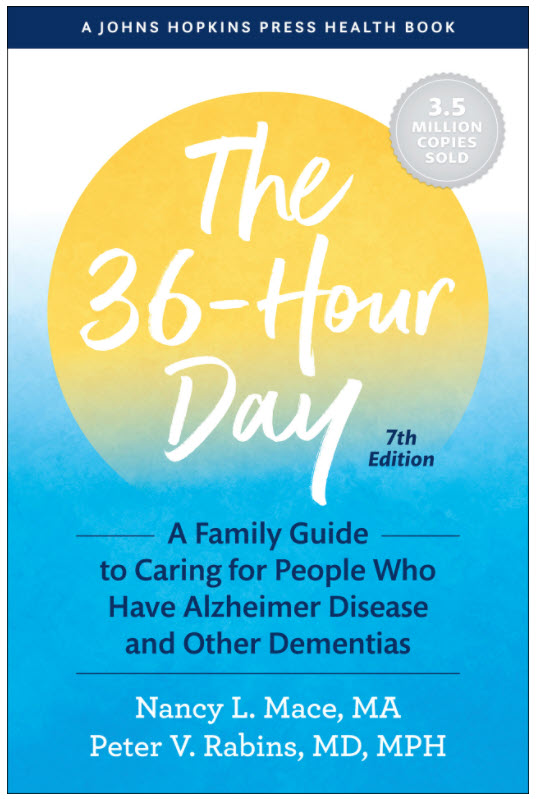
This is one of the commonly recommended books for dementia and it’s easy to see why. The book is now in its 7th edition and offers an incredible wealth of knowledge about dementia and its progression – every step of the way.
I have a physical copy of this book myself and it is seriously dense. That’s a good thing, though, as it means that most of your questions will be covered somewhere in the book.
While the book is incredible and worth picking up, it’s also difficult. You might need to read it in small doses, especially the sections on the later stages of dementia.
Making Tough Decisions About End-of-Life Care in Dementia
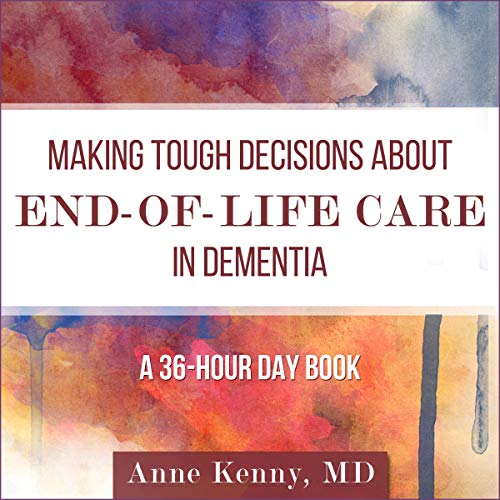
I listened to this one as an audiobook and found it fascinating.
As the title suggests, it focuses on end-of-life decisions surrounding dementia. We’re not just talking about long-term care either. The book also talks extensively about treatment, including questions about when it is time to stop treating recurring infections.
The writing style makes this topic much easier than it could be. There’s also a lot of compassion and space for different values and decisions, which I loved.
A few of the standout topic areas were:
- A distinction between living with dementia and dying with dementia.
- Details about how dementia tends to progress and classifications of different stages. This section also talked about the difficulty in assigning specific stages to dementia.
- Discussions about differing values, particularly among siblings, and ways to start looking for common ground.
- Information about the default approaches of the medical system and how families may need to fight to have their wishes upheld.
- A consideration of the legal side of dementia decisions and the options in this arena, like Power of Attorney.
Live and Laugh with Dementia
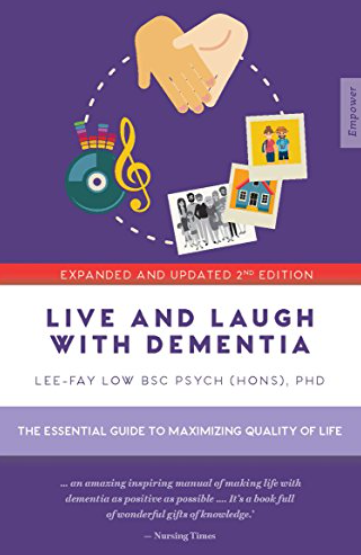
This book specifically focuses on activities with dementia patients, including specific activities, ways to initiate activities, things to watch out for, and the like. There is also a decent amount of information about dementia itself and how this may impact your loved one’s behavior.
There are plenty of case studies and examples throughout the book, which can help you to put the ideas in place practically.
As the author points out, you’ll probably need to adapt the approaches as you go. You’re the only one who can do this, as each patient is unique and you understand your loved one better than any book author can.
Living in the Moment: Overcoming Challenges and Finding Moments of Joy in Alzheimer’s Disease and Other Dementias
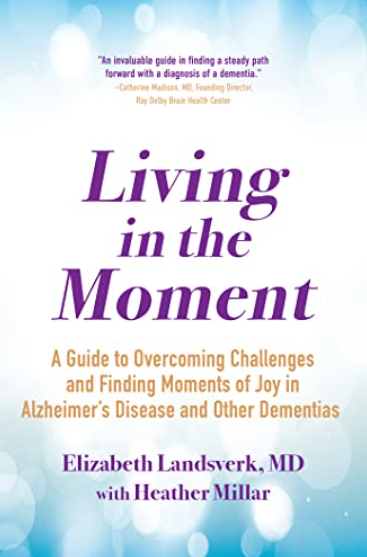
Like The 36-Hour Day, Living in the Moment aims to provide information about dementia and care approaches, but does so in a different way.
In writing this book, Elizabeth Landsverk aimed to create a resource that is easy for caregivers to read and isn’t too information dense. The book also takes a much needed holistic approach.
The biggest issue is that the author spends too long digging into specific medications, tests, and definitions about dementia at the beginning of the book. All of this information is important, but not so relevant if you’re specifically looking for practical caregiving advice.
Creating Moments of Joy Along the Alzheimer’s Journey
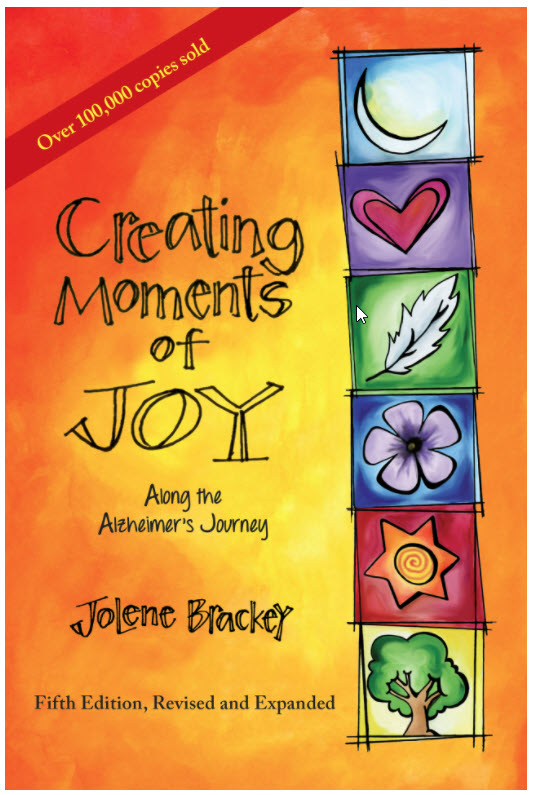
This book does exactly what the name suggests – it focuses on teaching you how to create good moments with dementia patients, regardless of the stage of dementia.
Some of the ideas in this book are common elsewhere, while others are unusual. The most powerful thing is how the author gets readers looking at and thinking about dementia differently.
There is much I love about this book, but it comes with a huge caveat – dementia patients are all different. Some, or even many, of the ideas mentioned in this book may not work for your loved one.
Your personal values may also influence how relevant the book is to you, as some of the techniques focus on being less than truthful or even outright lying to the patient.
Books That Don’t Focus on the Dementia Patient
The books in this section are a little different, as they don’t focus much on the experience of the dementia patient. Many don’t even talk much about caregiving.
Instead, they often talk about the experiences of loved ones, like daughters or spouses. The information can be incredibly important in helping you to navigate your own emotions and decisions.
Neither Married nor Single
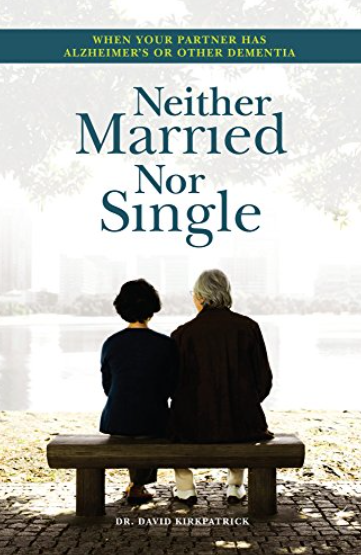
This book is written as a guide and conversation for people whose spouses have been diagnosed with dementia. It’s an unusual focus, as most books talk about the dementia patient themselves or about the impact of the diagnosis on their children.
Talking about spouses is powerful, as their experience is quite different.
As part of the book, Dr. Kirkpatrick talks about some often avoided areas, including how a dementia diagnosis affects intimacy and emotional connection in a relationship, along with the idea and implications of finding another life partner.
Dr. Kirkpatrick also highlights more familiar topics, including the importance of caring for yourself while being a caregiver and how to do so.
Where The Light Gets In: Losing My Mother Only To Find Her Again
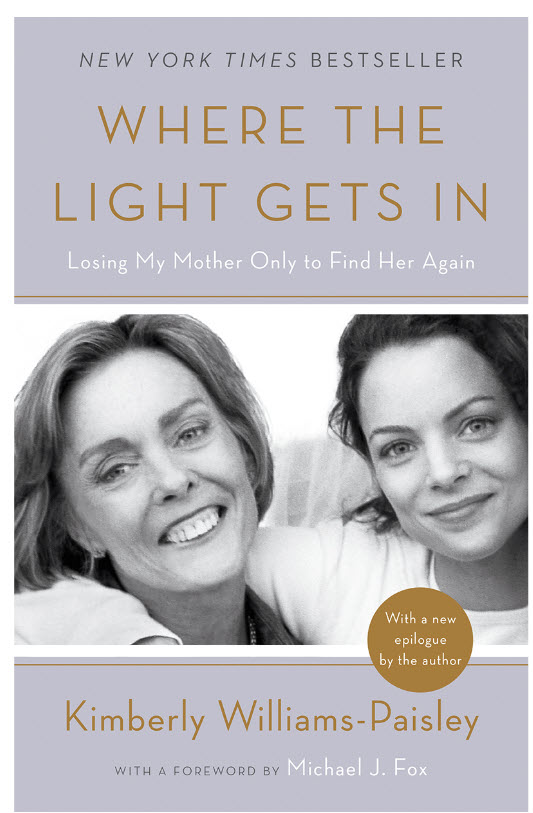
Where the Light Gets In provides a lot of insights about dementia, but that’s not the whole focus of the book. Instead, Where the Light Gets in is best considered a memoir, one that focuses on the relationship between Kimberly Williams-Paisley and her mother – both before and after her mother’s dementia diagnosis.
Kimberly’s mother, Linda, was diagnosed with a rare form of dementia called primary progressive aphasia. Kimberly’s book provides many descriptions and insights about how the disease progressed, along with the impacts that it had on the family.
The book has some powerful features, including the following.
- It’s a gentle introduction to dementia. While there are difficult parts, there are many positive ones too, which makes the hard aspects much less overwhelming.
- It offers insight into some of the emotions and difficult decisions that surround caring for a dementia patient, particularly in the late stages of the disease.
- It is a chance to see some of the emotional challenges and complexities that family members face.
- Kimberly talks openly about some of her emotional struggles and the ways forward that she found.
Resources That Show the Experience of Dementia
Books on dementia often focus on the practical aspects of dementia caregiving or the impact that dementia has on family members.
However, a few attempt to show that the experience is like for dementia patients.
This is incredibly important, as getting a sense of the dementia experience can help you be more compassionate and less frustrated as family members struggle. Such books can also provide insights into the approaches that may help.
What I Wish People Knew About Dementia: From Someone Who Knows
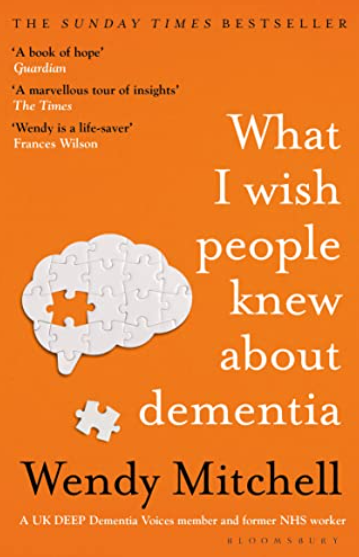
This book is unique.
The author, Wendy Mitchell, was diagnosed with young onset dementia at just 58 years of age. Since then she has written two books on dementia: Someone I Used to Know and What I Wish People Knew About Dementia.
Both books are fascinating. The first has a memoir-style and includes a lot of information about Wendy’s diagnosis and the early stages of her disease.
What I Wish People Knew About Dementia has memoir aspects too, but it is more focused on showing people the different ways that dementia affects people. Wendy also talks about the ways she’s found to get around some of the challenges.
The focus is particularly clear when you look at the chapters. These include: Senses, Relationships, Communication, Environment, Emotions, and Attitude.
The book does, it must be said, ramble at times – and there isn’t a ton of practical information. Even so, the emotional revelations throughout the book are incredibly valuable. Wendy’s words are also a crucial reminder that dementia patients still have wants, needs, wishes, and preferences that shouldn’t be ignored.
The Father
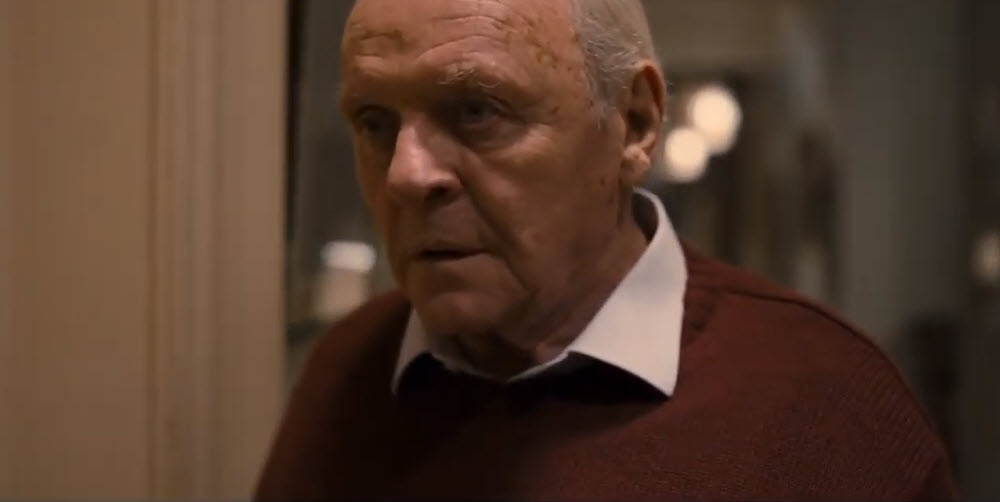
The Father is a film rather than a book, but it’s too important to ignore.
Unlike What I Wish People Knew About Dementia, The Father isn’t a positive film. It doesn’t aim to uplift and doesn’t pull its punches when it comes to emotional impact.
Still… the film is extremely insightful.
It’s told from the perspective of an aging man with dementia. This perspective means that viewers have little sense of what’s real and what isn’t for much of the film. We also get to see the way that dementia can warp reality, along with all the confusion that can come with it.
What’s more, the film is very accurate, more so than most other movies that touch on dementia.
While it’s a hard film to watch, it is worth seeing once to understand more about the challenges that can come with dementia.
Still Alice
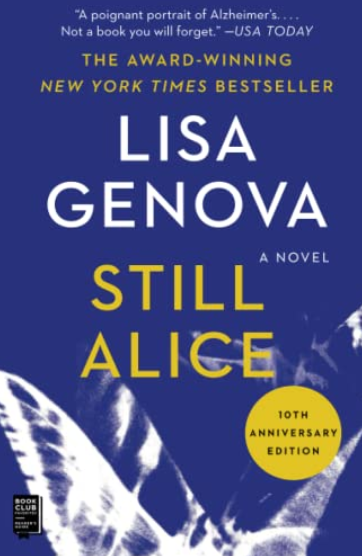
Still Alice is a novel and also a movie, following a woman with young onset Alzheimer’s disease. It isn’t as accurate as The Father as Alice’s disease progresses faster than is normally the case, particularly in the film version.
But, most other aspects of the book are surprisingly accurate, including how the disease can sneak up on patients and its emotional implications.
I prefer the book over the movie for this one, as it provides more information about Alice’s perspectives, particularly the early changes that were easy to miss and her fears.
However, the movie may be an easier entry point for some people.
A Crucial Caveat
You should always focus on critical thinking when using these books (or any resources, for that matter). We’re calling them the best books for dementia caregivers, which is true, but none of them will be 100% accurate for your situation. Dementia is a very individualistic condition that shifts and changes over time. Writers can’t possibly account for all of those differences, even when they try.
The dementia patient’s wishes and values will come into play too, along with your own values, family dynamics, finances, and other factors.
The information presented in these resources is still incredibly valuable, but it should never be considered the final word on what you should and shouldn’t do. You’ll always need to adapt to your current situation, just like you do with any other type of caregiving.
Why Dementia Knowledge is Still Lacking
Clearly there’s no shortage of books on dementia (we’ve only covered a fraction of them!). So, why do family members often know so little about the condition?
Part of the problem is that there are multiple types of dementia, including Alzheimer’s disease, frontotemporal dementia, and vascular dementia. There’s also mixed dementia, where two or more types of dementia can be present.
The path of dementia differs between these different types and also between individuals, making each dementia experience unique.
This uniqueness means can mean that family members need to sift through many resources to find the pieces of information that are relevant to them.
Another issue is how hard it is to talk about dementia.
Death is a scary topic for many of us and comes with a considerable social taboo. This is one reason why some people never engage in dementia advance care planning, despite the crucial importance of doing so.
In some ways, dementia is even worse, as people in the late stages of the disease barely resemble their former selves, yet are still alive. Family members often experience ambiguous loss, which can involve strong and ongoing aspects of grief.
Some people diagnosed with dementia may also be unwilling to talk about the condition, especially in relation to future plans. Sometimes this resistance may be an attempt to avoid thinking about the disease for as long as possible.
Unfortunately, not learning and talking about dementia cause many issues. In a later post, we’ll talk about why such conversations are so difficult, their importance, and how you can have them successfully.
Feeling Overwhelmed?
Check out our Caregiving Consulting service for personalized support and guidance.


Leave a Reply